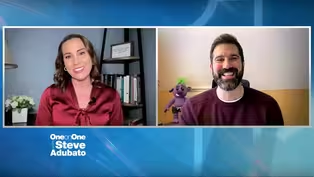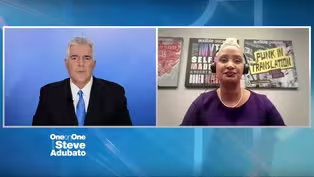One-on-One
New Jersey Hall of Fame president highlights his new film
Clip: Season 2025 Episode 2809 | 8m 38sVideo has Closed Captions
New Jersey Hall of Fame president highlights his new film
Steve Adubato sits down with Steve Edwards, Executive Producer of Lucky Jack and President of the New Jersey Hall of Fame, to discuss the film that honors his father’s journey and how that legacy inspired Edwards to establish the New Jersey Hall of Fame.
Problems playing video? | Closed Captioning Feedback
Problems playing video? | Closed Captioning Feedback
One-on-One is a local public television program presented by NJ PBS
One-on-One
New Jersey Hall of Fame president highlights his new film
Clip: Season 2025 Episode 2809 | 8m 38sVideo has Closed Captions
Steve Adubato sits down with Steve Edwards, Executive Producer of Lucky Jack and President of the New Jersey Hall of Fame, to discuss the film that honors his father’s journey and how that legacy inspired Edwards to establish the New Jersey Hall of Fame.
Problems playing video? | Closed Captioning Feedback
How to Watch One-on-One
One-on-One is available to stream on pbs.org and the free PBS App, available on iPhone, Apple TV, Android TV, Android smartphones, Amazon Fire TV, Amazon Fire Tablet, Roku, Samsung Smart TV, and Vizio.
Providing Support for PBS.org
Learn Moreabout PBS online sponsorship(upbeat music) (children laughing) (upbeat music) - [Speaker 1] I want my daughters Shera and Naomi to know what their grandfather did.
I want them to know, no matter how daunting it is, that they should always chase their dreams.
(upbeat music) - Jack was the poorest guy of any guy I've ever known in my life.
- They were just very, very poor.
- [Speaker 1] He always wanted to be a doctor, but never really applied himself in school.
He thought somehow he could teach himself like Lincoln taught himself how to be a lawyer.
- [Speaker 2] That was Lucky Jack.
(upbeat music) - We are thrilled to be joined once again by our good friend and colleague, Steve Edwards, who's the president of New Jersey Hall of Fame, but also the producer of a terrific film you have to check out.
It's called "Lucky Jack."
Steve, how you doing, my friend?
- I'm doing well, Steve.
Thanks for having me on.
- Now, "Lucky Jack" wasn't any Jack, he was your dad.
- Lucky Jack was the nickname of my dad.
He was a great Newark native, like me, like yourself.
He grew up in the Seth Boyden housing projects in a very dysfunctional family back in the 1940s and '50s.
And his story, and really it's as much my mom's story as it is my dad, is quite remarkable I think.
He was a 30-year-old high school dropout.
He was unemployed, had a wife and two children at the time, and in 1966, he did what a lot of people in the '60s did.
He smoked a joint, he put on "Man of La Mancha's Impossible Dream."
He donned a surgeon smock that he wore when he drew blood at Barnabas years before that.
So he looks into the mirror and he sees not only a doctor staring back at him, but a brain surgeon and he resolves himself in that moment, July, August, 1966, that this unemployed high school dropout is going to become a brain surgeon.
Somehow he conned my mom into it.
He went to Rutgers in the late '60s, very turbulent, obviously, campus in the late '60s with the riots and so forth, and I'll make a long story short, nine years later, he was accepted into the neurosurgical program at Mount Sinai Hospital in Manhattan.
I think it's a tremendous story for anyone that's interested in understanding how powerful all of our wills are.
My dad always used to say, "We're a sum of all our thoughts and we could will so many of our dreams to happen".
And he's an example of it.
He didn't give up.
It's a complex story beyond that, but it's really remarkable.
- You know, Steve, you and I have had many offline conversations about our dads and talking about my dad inducted last year and the impact my dad had on my life.
Good, bad, and indifferent all kinds of ways.
You have said that you're not sure the Hall of Fame or at least your role in leading the Hall of Fame would've happened if it were not for your dad's motivation of you, inspiring of you.
Is that fair?
- There's no question about it.
When we first organized the New Jersey Hall of Fame, the mission was gonna be to help children around the world.
After my dad passed, I talked to state leaders and said, you know, here's an example of someone who followed the concept of Arete.
It's a ancient Greek wisdom that Plato, Aristotle and Socrates referred to as the essence of life.
Means the act of actualizing your highest and best sense of self for the greater good.
And my dad, that was the name of his boat, that was the principle that sort of guided him in life and I suggested, why don't we just focus on Jersey children and start there?
And that's what we did.
We went a different direction in terms of our charitable mission.
And I just think there's a lot of kids out there and a lot of adults for that matter, that can use that inspiration, that can need to be reminded that this world is, in my opinion, it's about the opportunity we have to realize our highest sense of self.
It's not about paying bills, it's not about sitting in traffic.
It's about getting up every day and fighting for your highest best sense of self.
So that's what the Hall of Fame message that we've been getting out really almost for 20 years now.
And hopefully we'll be doing that for many years to come.
- By the way, Steve comes to us from the Hall of Fame live late night studio, if you will.
It is at the American Dream and the website is up.
Make sure you go check it out.
Steve, lemme do this, talking about your dad.
He was not a great student growing up, right?
And he had many hardships, many hardships, but the title "Lucky Jack," why "Lucky Jack?"
- Yeah.
So he got that nickname back in the 1950s.
They used to go to the gambling places in Newark and he used to have the opposite of, actually, the story is that he won a lot of money one night with a group of his friends and they left and they were gonna go to the diner and celebrate.
He left his raincoat behind in the gambling place and he said, "Hold on one minute, I gotta get my rain jacket."
His friends begged him.
They said, "No, Jack, don't go back."
"No, it's my favorite rain jacket."
Make a long story short, about 25 minutes later, he came back out.
He had the rain jacket, but he lost every dollar that he had won and that was in his pocket.
So they gave him the nickname "Lucky Jack."
My dad really did have the opposite of good luck really his whole life.
That was just one example and that's why we named the film "Lucky Jack," because I think in the end, although he didn't get very lucky in medicine either, your viewers will have to see the film to find out.
In the end, I think he was lucky.
And more importantly, he considered himself lucky, had very few regrets at the end of his life.
- Last question, Steve, you made this film happen on a professional, but clearly on a personal level and you had wanted to do it for a long time.
What does this mean to you, the film?
- This film I think was a cathartic experience for me because my dad passed under very tragic circumstances.
- He was only 69 years of age.
- 69 years old - Terminal liver cancer?
- He contracted Hep C, I'll say, give away the ending, but he contracted Hep C in the operating room, which is an occupational hazard for surgeons.
But those last 28 days of his life, he wrote and said so many beautiful things for those around him that wanted to listen.
And essentially what he said is he had no regrets.
He was able to live his impossible dreams, do what he loved, and that he thought was the most important part of life.
And that's why we called it "Lucky Jack," because I'd like to think that he was a lucky guy.
- Thank you my friend.
The film is "Lucky Jack."
Check it out.
Our friend Steve Edwards made it happen.
We'll talk to you soon, buddy.
All the best.
- Steve, thank you so much for having me.
- You're a great partner.
I'm Steve Adubato.
That is a great filmmaker and the president of Hall of Fame, Steve Edwards.
We'll see you next time.
- [Narrator] One-On-One with Steve Adubato is a production of the Caucus Educational Corporation.
Funding has been provided by The New Jersey Education Association.
The New Jersey Economic Development Authority.
Kean University.
Holy Name.
The Fidelco Group.
PSE&G.
Horizon Blue Cross Blue Shield of New Jersey.
NJM Insurance Group.
And by The North Ward Center.
Promotional support provided by NJ.Com.
And by New Jersey Monthly.
- (Narrator) New Jersey is home to the best public schools in the nation, and that didn't happen by accident.
It's the result of parents, educators and communities working together year after year to give our students a world class education.
No matter the challenge, because parents and educators know that with a shared commitment to our public schools, our children can learn, grow and thrive.
And together, we can keep New Jersey's public schools the best in the nation.
How children's literature can teach important life lessons
Video has Closed Captions
Clip: S2025 Ep2809 | 10m 11s | How children's literature can teach important life lessons (10m 11s)
Initiatives at Audible that are driving growth in Newark
Video has Closed Captions
Clip: S2025 Ep2809 | 9m 21s | Advocating equal access to quality education for all students (9m 21s)
Providing Support for PBS.org
Learn Moreabout PBS online sponsorship
- News and Public Affairs

Top journalists deliver compelling original analysis of the hour's headlines.

- News and Public Affairs

FRONTLINE is investigative journalism that questions, explains and changes our world.












Support for PBS provided by:
One-on-One is a local public television program presented by NJ PBS

